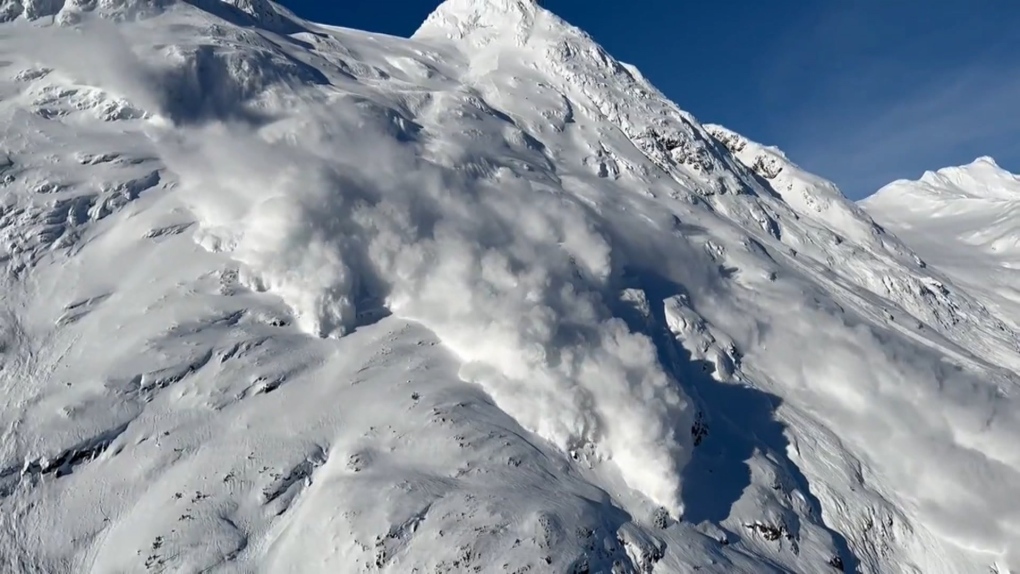Avalanche risk prompts warning, Trans-Canada Highway closure after 'biggest storm of the season' in B.C.
 Avalanche forecasters are comparing this year's dangerous season to the winter of 2002-03, when the deaths of 29 people led the creation of Avalanche Canada.
Avalanche forecasters are comparing this year's dangerous season to the winter of 2002-03, when the deaths of 29 people led the creation of Avalanche Canada.
Dangerous snowpack conditions in British Columbia and Alberta have prompted avalanche forecasters to issue a "special public avalanche warning" following significant snowfall this week in the Western Canadian backcountry.
The joint advisory Thursday from Avalanche Canada, Parks Canada and the B.C. government says the warning is in effect immediately and will remain in place through to the end of March 4.
"This has been the biggest storm of the season, and we know backcountry users are eager to enjoy the snow," Avalanche Canada forecaster Tyson Rettie said in the advisory. "But it's vital to not underestimate the instability of these weak layers. Any avalanche triggered on them could be deadly."
The agency's most recent forecast data show dangerous "widespread natural storm slab" avalanche conditions covering much of B.C.'s southern and northern coastal mountains, as well the southeastern and central Rocky Mountains into western Alberta.
Recent storms dumped heavy snow at high elevations throughout the backcountry, leaving significant accumulation atop precariously weak layers of precipitation that fell in early February, Avalanche Canada says.
"We've been tracking these weak layers closely over this past month," Rettie added. "While their structure has different forms across different regions, the result is the same – highly problematic layers that remain reactive to human triggering."
Trans-Canada Highway closure
The avalanche danger forced the overnight closure of the Trans-Canada Highway between Revelstoke, B.C., and Golden, B.C. on Wednesday. The major east-west highway remained closed without a detour route Thursday morning before reopening around 12:45 p.m., according to DriveBC.
Avalanche Canada is advising backcountry users to make cautious terrain choices. "A good way to do this is by sticking to lower-angle slopes and choosing smaller objectives that minimize the consequences of an avalanche," the agency said.
B.C.'s emergency management minister echoed the warning in the advisory Thursday.
"Given the unpredictability of avalanches, and their devastating potential consequences, we’re urging everyone to stay safe by exercising caution and making informed decisions when planning a trip in the backcountry," said Bowinn Ma. "Please follow the guidance of Avalanche Canada during this time of heightened risk."
Avalanche Canada urges anyone venturing into the backcountry at times of elevated slide risk to check their local forecast and always carry essential rescue gear, including a transceiver a probe and a shovel.
Two people have died in avalanches in Western Canada since the start of the year, including a snowmobiler who triggered an avalanche near the B.C.-Alberta border last weekend.
Sixteen people were killed by avalanches in Canada in 2023. Fourteen of those deaths were recorded in B.C.
CTVNews.ca Top Stories

More than 115 cases of eye damage reported in Ontario after solar eclipse
More than 115 people who viewed the solar eclipse in Ontario earlier this month experienced eye damage after the event, according to eye doctors in the province.
Toxic testing standoff: Family leaves house over air quality
A Sherwood Park family says their new house is uninhabitable. The McNaughton's say they were forced to leave the house after living there for only a week because contaminants inside made it difficult to breathe.
Decoy bear used to catch man who illegally killed a grizzly, B.C. conservation officers say
A man has been handed a lengthy hunting ban and fined thousands of dollars for illegally killing a grizzly bear, B.C. conservation officers say.
B.C. seeks ban on public drug use, dialing back decriminalization
The B.C. NDP has asked the federal government to recriminalize public drug use, marking a major shift in the province's approach to addressing the deadly overdose crisis.
OPP responds to apparent video of officer supporting anti-Trudeau government protestors
The Ontario Provincial Police (OPP) says it's investigating an interaction between a uniformed officer and anti-Trudeau government protestors after a video circulated on social media.
An emergency slide falls off a Delta Air Lines plane, forcing pilots to return to JFK in New York
An emergency slide fell off a Delta Air Lines jetliner shortly after takeoff Friday from New York, and pilots who felt a vibration in the plane circled back to land safely at JFK Airport.
Sophie Gregoire Trudeau on navigating post-political life, co-parenting and freedom
Sophie Gregoire Trudeau says there is 'still so much love' between her and Prime Minister Justin Trudeau, as they navigate their post-separation relationship co-parenting their three children.
Last letters of pioneering climber who died on Everest reveal dark side of mountaineering
George Mallory is renowned for being one of the first British mountaineers to attempt to scale the dizzying heights of Mount Everest during the 1920s. Nearly a century later, newly digitized letters shed light on Mallory’s hopes and fears about ascending Everest.
Loud boom in Hamilton caused by propane tank, police say
A loud explosion was heard across Hamilton on Friday after a propane tank was accidentally destroyed and detonated at a local scrap metal yard, police say.






























